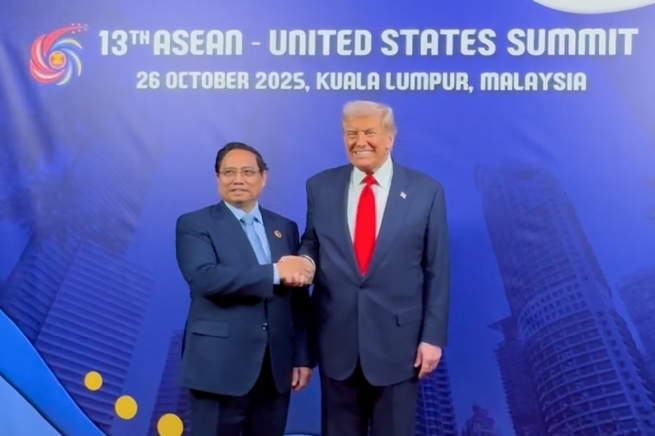9:59:14 AM | 11/3/2025
On the occasion of attending the 47th ASEAN Summit and related meetings in Kuala Lumpur, Malaysia, Vietnamese Prime Minister Pham Minh Chinh met briefly with U.S. President Donald Trump on the sidelines of the ASEAN-U.S. Summit.
During their meeting, the two leaders agreed to advance the Comprehensive Strategic Partnership for peace, cooperation, and sustainable development between Vietnam and the U.S. in a deeper, more practical, and effective way, including expediting the signing of a reciprocal, fair, and balanced trade agreement to encourage increased U.S. investment in Vietnam.

Prime Minister Pham Minh Chinh proposed that the U.S. recognize Vietnam as a market economy and remove the country from the U.S. strategic export control lists D1 and D3. President Trump responded positively and instructed senior U.S. officials, including representatives of the Department of the Treasury and the Office of the U.S. Trade Representative attending the summit, to engage promptly with Vietnam on these matters.
According to the Ministry of Industry and Trade, on October 26, Vietnam and the U.S. agreed to issue a Joint Statement on the Framework of the Reciprocal, Fair, and Balanced Trade Agreement, during the ASEAN Summit held on October 26-28, 2025, in Kuala Lumpur.
The joint statement reflects both countries’ progress in trade negotiations and recognizes the efforts of government agencies and businesses from both sides to build stable, sustainable, and balanced economic and trade relations in line with the Vietnam-U.S. Comprehensive Strategic Partnership.
The statement outlines the main components of the forthcoming agreement, under which Vietnam and the U.S. will cooperate constructively to address mutual concerns over non-tariff barriers, harmonize commitments related to digital trade, services, and investment, and discuss intellectual property rights, sustainable development, and measures to strengthen supply chain resilience.
In the coming period, the two sides will continue discussions and follow-up work to finalize the Reciprocal, Fair, and Balanced Trade Agreement based on openness, mutual respect, equality, and the principles of independence, sovereignty, mutual benefit, and consideration for each other’s development level.
The agreement will build on the long-standing economic relationship between the two countries, including the U.S.-Vietnam Bilateral Trade Agreement, signed in 2000 and effective since 2001.
Under the main provisions of the new Reciprocal, Fair, and Balanced Trade Agreement, Vietnam will grant preferential market access to nearly all U.S. agricultural and industrial exports.
Meanwhile, the U.S. will maintain a reciprocal tariff rate of 20%, as stipulated in Executive Order No. 14257 dated April 2, 2025, as amended, for goods originating from Vietnam. It will also identify products listed in Annex III of Executive Order No. 14356 dated September 5, 2025, titled “Potential Tariff Adjustment for Like-Minded Partners,” that qualify for a zero % reciprocal tariff.
Both sides agreed to cooperate constructively to address mutual concerns over non-tariff barriers affecting bilateral trade in priority sectors. Vietnam committed to resolving specific issues such as recognizing vehicles manufactured under U.S. safety and emission standards, addressing licensing procedures for U.S. medical equipment imports, and simplifying regulatory requirements and approval processes for U.S. pharmaceuticals.
Vietnam will also fully implement its obligations under international intellectual property (IP) treaties to which it is a member, and address U.S. concerns regarding conformity assessment procedures.
The U.S. and Vietnam have pledged to remove and prevent barriers to U.S. agricultural products in the Vietnamese market. This includes establishing a U.S.-compliant monitoring mechanism and accepting mutually recognized certificates issued by U.S. regulatory agencies.
Both countries also agreed on commitments related to digital trade, services, and investment, and will continue discussions on IP rights, labor, environment, customs, trade facilitation, regulatory practices, and the prevention of trade-distorting behaviors by state-owned enterprises.
Vietnam and the U.S. committed to strengthening cooperation toward common goals of enhancing supply chain resilience, addressing tax evasion practices, and coordinating on export control measures.
In addition, both sides acknowledged several recent commercial agreements between Vietnamese and U.S. businesses in agriculture, aerospace, and energy. Vietnam Airlines signed a contract with Boeing to purchase 50 aircraft, valued at over US$8 billion. Vietnamese companies also signed 20 memoranda of understanding with U.S. partners to purchase agricultural products worth an estimated US$2.9 billion.
In the coming weeks, the two sides will continue exchanges to finalize the content of the Reciprocal, Fair, and Balanced Trade Agreement, prepare for its signing, and complete the necessary domestic procedures for the agreement to officially take effect.
Quynh Chi (Vietnam Business Forum)